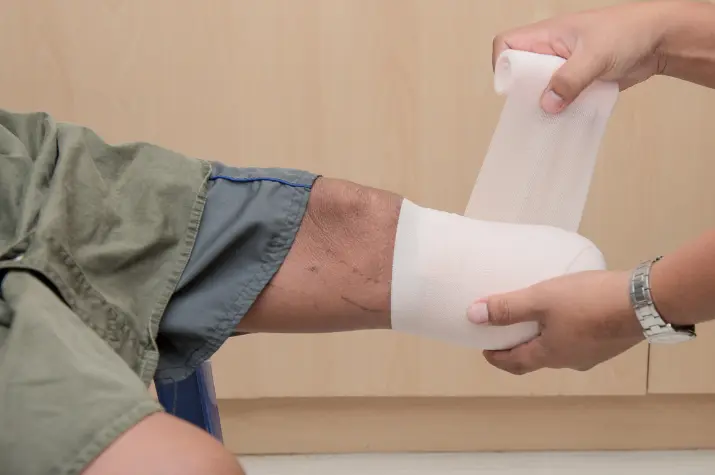
A Podiatrist specializes in treating illnesses related to your feet and ankle area.
The Professional podiatrist can
- Prescribe medication
- Treat fractures
- Perform surgery
- Use laboratory and imaging tests for diagnostic purposes.
Podiatrists often work with other healthcare professionals to treat primary foot disorders or conditions that are related to other conditions (such as diabetes or cancer).
A Podiatrist attends medical school and specializes in foot medicine. They also attain licenses from relevant certification boards that are renewed yearly to remain relevant in the field of medicine.
They gain skills in general foot defects such as smelly feet, arthritis, flat feet, and sprains. They may also go for additional training to specialize in complicated procedures for ailments such as tumors, ulcers, and flexible casting.
If you have any foot complications related to diabetes, you should see a podiatrist for specialized treatment as early as possible, as late treatment could mean you may have to cut off the affected part.
Professionals such as those at the Center for Podiatric Care and Sports Medicine provide various treatments and services for general and/or specific foot and ankle complications.
Seven important reasons you need to see a podiatrist are:
1. Nail Infection
You may experience a fungal attack on your foot that affects your nails.
An infected nail may cause further complications if left untreated. It can affect any person at any age but commonly affects older adults.
You can visit your family doctor to treat a nail infection if it is still in the early stages of the disease.
However, your doctor may refer you to a specialist if the nail infection is developed and needs specialized care to treat.
2. Arthritis and Gout
Lifestyle diseases may affect the circulation of blood to your feet. It may also result in the deposit of toxins at the joints of your foot that cause severe pain.
Some symptoms of Gout are:
- Intense Joint Pain
- Redness
- Inflammation
- Discomfort in Feet
When you experience such symptoms, visit your doctor for assessment and possible treatment.
It also helps to seek medical attention early to avoid further complications, as gout on the feet indicates that the kidney may not be functioning as required.
It could also mean that gout may manifest in the organ and cause kidney failure due to the deposit of toxins in the kidney that kill kidney cells.
3. Flat Feet

The condition occurs when the bones of your feet fuse during development.
A result is having a flat foot and fused bones that ache due to strain while walking caused by a lack of flexibility.
The problem manifests as you age and when you engage in sports. You also have difficulty walking and may need special footwear to counter the problem.
Foot braces as well as arch support help to manage the condition and help treat problematic foot ligaments.
Sometimes people confuse podiatrists with orthopedists, which an allied health professionals, trained to modify footwear and use supportive tools like casting, bracing, etc. to correct foot and ankle disorders.
4. Diabetes
If you have diabetes, you may have experienced a problem with your feet and ankle area. Diabetes may cause numbness in your feet due to a lack of adequate blood circulation to nourish the cells in your feet.
When the problem persists for a long time, it could result in your foot rotting due to the death of cells.
“People with diabetes are at more risk to develop dangerous foot ulcers”
Ulcerations are common in diabetic foot and should be carefully monitored and treated by a podiatrist to reduce the possibility of amputation.
Unsupervised ulcers can develop and quickly become infected, which can have serious consequences.
Diabetes causes your feet to lose blood circulation, and nerve endings to stop functioning which causes numbness. It would help if you saw a podiatrist to help with foot ulcers that develop from the condition.
You may also require the help of a neurologist and a vascular surgeon to help with the nerve tissue and the blood circulation defect.
| Read also: [12 Effective Tips] Your Diabetes And Foot Care |
5. Amputations

The podiatrist is an integral part of the treatment team and can often successfully prevent amputations.
The key to amputation prevention in diabetics is early detection and regular foot examinations by a podiatrist, which are carried out at least once a year.
In addition to these checkups, there are warning signs that you should be aware of so that they can be identified and confirmed by your GP or podiatrist.
6. Feet Sports Injuries
Some Sports-related injuries in which a patient must see a podiatrist are
- Achilles Tendinitis
- Plantar Fasciitis
- Neuroma
- Heel Spur
- Stress Fractures
- Ankle Sprain
Your podiatrist knows how to treat the injuries and prevent the wounds from spreading and this can be an important cure factor in keeping your feet healthy and strong.
| See also: 5 Most Common Foot Injuries and How to Avoid Them |
7. Accidental Feet Injuries & Foot Surgery
Podiatrists specialize in
- Feet surgeries
- Reset accidentally broken bones
- Accidental misstep or fall
- Prescribe related drugs
- The order required lab tests or X-rays
Advice for Patients
If you have problems with your feet and ankles, talk to your family doctor first about a referral to see a podiatrist.
Patients can choose a podiatrist by consulting with family, friends, colleagues, or other doctors for recommendations.
Many podiatrists also have websites and practically all of them are listed in community directories. Patients can visit these websites and select a podiatrist accordingly.
| Read also: 10 Most Common Car Accident Injuries |
About The Author:
My name is Wahab. My interest is sharing different ideas and tips. I like to share ideas and as a result, I would be delighted to hear from you.




